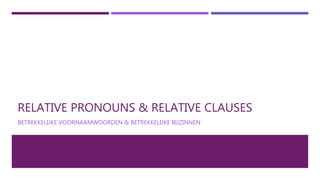
5h relative pronouns & clauses
- 1. RELATIVE PRONOUNS & RELATIVE CLAUSES BETREKKELIJKE VOORNAAMWOORDEN & BETREKKELIJKE BIJZINNEN
- 2. RELATIVE PRONOUNS hebben betrekking op (wijzen naar) het onderwerp van de zin of een bijzin. Je kunt er zinnen mee aan elkaar koppelen. Je gebruikt: WHO / THAT bij personen They are the visitors who/that I told you about. The man who/that lives there, is my uncle. WHICH / THAT bij dingen en dieren Those are the cookies which/that I made. The dog which/that had attacked a child, was put down. Aha! Dan kan ik dus altijd ‘that’ gebruiken?! Nou … nee. THAT mag niet gebruikt worden in een bijzin die tussen komma’s staat; THAT komt dus nooit na een komma! The teacher, who has worked here for years, decided to quit his job. The horse, which she had trained so well, did not do well in the match.
- 3. WHO, WHICH OF THAT WEGLATEN Als een bijzin een ander (grammaticaal) onderwerp heeft, mag je het betrekkelijk vnw weglaten The boy (who/that) I spoke to yesterday is not in my class. The cat (which/that) my brother took home, was really cute. vergelijk: The man who/that told us about the accident, was really shaken up. We had dinner in a restaurant which/that was really well-known.
- 4. WHOSE (bezit) WHOSE = van wie/wiens The actor whose reputation was really bad, decided to change his lifestyle. The athlete whose performance has been bad lately, was dropped from the national selection. The student, whose health was poor, did well on the tests nonetheless. Combinatie met een voorzetsel Als je een voorzetsel gebruikt in combinatie met who/which/that, komt dat voorzetsel achteraan in de bijzin She is the girl (who/that) I told you about. This is the house which we live in. Je mag het voorzetsel ook vóór which of who zetten. Bij which verandert er niets, maar ‘who’ wordt dan ‘whom’ She is the girl about whom I told you The boy to whom you’re talking is 15 years old